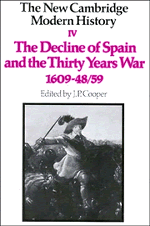Book contents
- Frontmatter
- INTRODUCTORY
- Chapter I General introduction
- Chapter II The European economy 1609–50
- Chapter III The exponents and critics of absolutism
- Chapter IV The scientific movement and its influence 1610–50
- Chapter V Changes in religious thought
- Chapter VI Military forces and warfare 1610–48
- Chapter VII Sea-power
- Chapter VIII Drama and society
- THE CENTRAL CONFLICTS
- THE UNMAKING AND REMAKING OF STATES
- THE FRONTIERS OF EUROPE
Chapter III - The exponents and critics of absolutism
from INTRODUCTORY
Published online by Cambridge University Press: 28 March 2008
- Frontmatter
- INTRODUCTORY
- Chapter I General introduction
- Chapter II The European economy 1609–50
- Chapter III The exponents and critics of absolutism
- Chapter IV The scientific movement and its influence 1610–50
- Chapter V Changes in religious thought
- Chapter VI Military forces and warfare 1610–48
- Chapter VII Sea-power
- Chapter VIII Drama and society
- THE CENTRAL CONFLICTS
- THE UNMAKING AND REMAKING OF STATES
- THE FRONTIERS OF EUROPE
Summary
Between 1610 and 1659 absolutism triumphed almost everywhere in Europe. Although in England monarchical absolutism failed, parliamentary absolutism was victorious. States were threatened by great wars and by the disruptions of wars of religion. Men's minds were challenged by theories of popular sovereignty, of contract and tyrannicide, and by new mechanistic views of the universe. There were economic crises, some caused by the falling volume of silver arriving from America, others by bad harvests, famines and epidemics, which were perhaps more frequent than in the sixteenth century. The remedy for these troubles seemed to be a political power less shackled by laws, customs and privileges, and better able to impose a common purpose upon the members of the body politic. At the centre of all the theoretical conflicts were the two principles of sovereignty and of raison d'état, developed by Jean Bodin and Machiavelli respectively. Sovereignty was defined by Bodin as ‘the supreme power in the State not bound by the laws … not recognising any superior’; its attributes are to legislate, to raise armies, make war and peace, pass final judgements on cases, raise taxes, coin money, etc. Raison d'état covered whatever actions the prince might have to take in order to secure the safety and growth of the state. Bodin and Machiavelli were criticized, but almost all their critics borrowed their fundamental ideas while attempting to Christianize or adapt them. Our study of political concepts cannot be restricted to the ideas of theorists. We must try to consider what statesmen, administrators and members of different social groups thought of absolutism, what ideas and slogans moved men to act—and their relationship to their whole environment.
- Type
- Chapter
- Information
- The New Cambridge Modern History , pp. 104 - 131Publisher: Cambridge University PressPrint publication year: 1970
- 3
- Cited by



